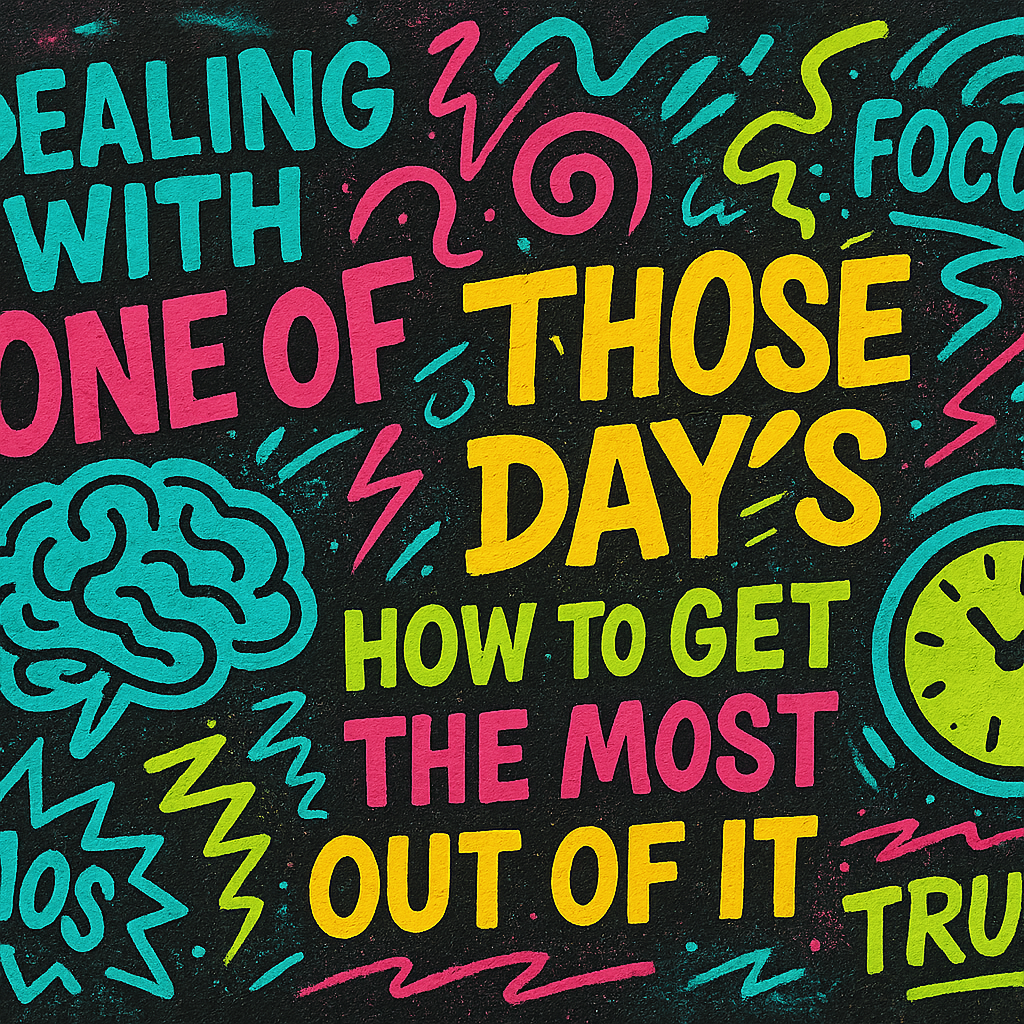
Dealing With ‘one Of Those Days’ How To Get The Most Out Of It
Share
Do you ever wake up and think, “I just can’t face the day”? You’re not alone. In our latest podcast episode, Stephen Martin opens up about those tough mornings when motivation is low and the mind refuses to cooperate. He talks about how normal it is to feel burnt out, especially for those who identify as neurodiverse, and offers tips on working with your brain rather than against it.
In this chat, Stephen reminds us it’s okay to step back and not force ourselves every second. If we recognise the signs, we’re far more likely to regain our spark. He also lays out how important it is to aim for bite-sized goals and remember that progress comes in all shapes and sizes.
Facing Low Motivation
Sometimes you don’t have the willpower to do anything big. You’re not lazy, it’s just how our minds and bodies work. Stephen points out that pushing through mindlessly can backfire, especially if you’re prone to overwhelm.
Instead of criticising yourself, pause for a moment. Think about what one small task will move you forward. Then do that task first. It might be as simple as replying to one email or decluttering your floor.
“It’s okay to have tough days. Your best is good enough.” — Stephen Martin
Acknowledging these days as normal can take away unnecessary guilt. It also helps guard against letting a temporary dip turn into a full-fledged slump.
The Reality of Burnout
Burnout creeps in without notice. One day you’re on top of your game, the next you’re exhausted. If you have ADHD or dyslexia, you might push harder to keep up with everyone else, unaware that you’re running on fumes.
Burnout isn’t just feeling tired. It can damage your mental health. Stephen shares how he tried to bulldoze through tasks, thinking it would fix the problem. But it often made it worse.
- Ongoing fatigue can lead to anxiety.
- Irritability can affect your relationships.
- Lack of motivation can feed feelings of failure.
Choosing self-care over constant hustle might feel unfamiliar, but it’s essential to reset the brain. Recognise the warning signs. Give yourself permission to rest and recharge.
Setting Realistic Goals
For many of us, goal setting feels like piling on more pressure. Stephen emphasises that goals can be powerful if they’re shaped around your current abilities, not the moment you’re at peak performance.
It helps to visualise what you actually want, rather than what you think you should want. That might mean fewer goals but with deeper impact. Consider writing them down or creating a quick mental picture every morning.
- Choose goals that excite you.
- Break them into small chunks.
- Allow space for flexibility.
If you feel your energy slipping at any point, recheck those goals. Are they still serving you, or do they need a quick tweak?
The Power of Self-Care
Self-care might sound like a buzzword, but it’s hard to argue against something that can lift your mood and sharpen your focus. Stephen speaks a lot about how finding balance can transform your daily routine. It’s not all about bubble baths — though if that helps, go for it.
Mindfulness, light exercise, journalling, or even setting aside five minutes to daydream can calm your racing mind. Those gentle pauses between tasks can keep you from a downward spiral.
Think about what brings you a moment of calm. Give yourself permission to do it. It’s not wasting time if it recharges your brain. You’ll get more done after a little reset than if you soldier on without pause.
Finding Balance
“Balance” can feel like a myth, but Stephen believes it’s more about weaving consistent breaks and small wins into your day. You don’t have to be perfect. You just have to listen to your mind and body.
A balanced approach to productivity means showing up for the tasks that matter while leaving a little space to breathe. When motivation is low, celebrate the tiny steps. This alone can fuel you to keep going.
We all have different thresholds. Some days you can handle a sprint, other days you need to slow to a gentle jog. That’s normal. Remember, tomorrow brings a fresh chance to try again.
- Check in with yourself before starting any big task.
- Don’t beat yourself up if you need a rest.
- Adjust your goals when your energy is low.
Balance doesn’t happen overnight. It’s a practice. Keep tweaking and trying new approaches.
Key Takeaways
- Low motivation days are normal and don’t define you.
- Pushing through burnout can sometimes worsen your situation.
- Setting realistic goals keeps you from feeling overwhelmed.
- Visualising achievable outcomes can spark motivation.
- Venting frustrations is healthier than bottling them up.
- Small wins on tough days can be huge.
- Short breaks can lift your overall productivity.
- Self-care is vital for long-term wellbeing.
- Tomorrow always offers a new start.
- Balanced living helps you manage the highs and lows.
If you’re looking for more mindset tips and stories, listen to the full episode above. You can also learn more about our resources, get 20% off your first order at addednutrtion.com, and join our community at rightbrainresetters.com. It’s your chance to dive deeper into practical strategies for adults with dyslexia, ADHD, and anyone who wants a more balanced life. Give it a try and see what resonates with you.

